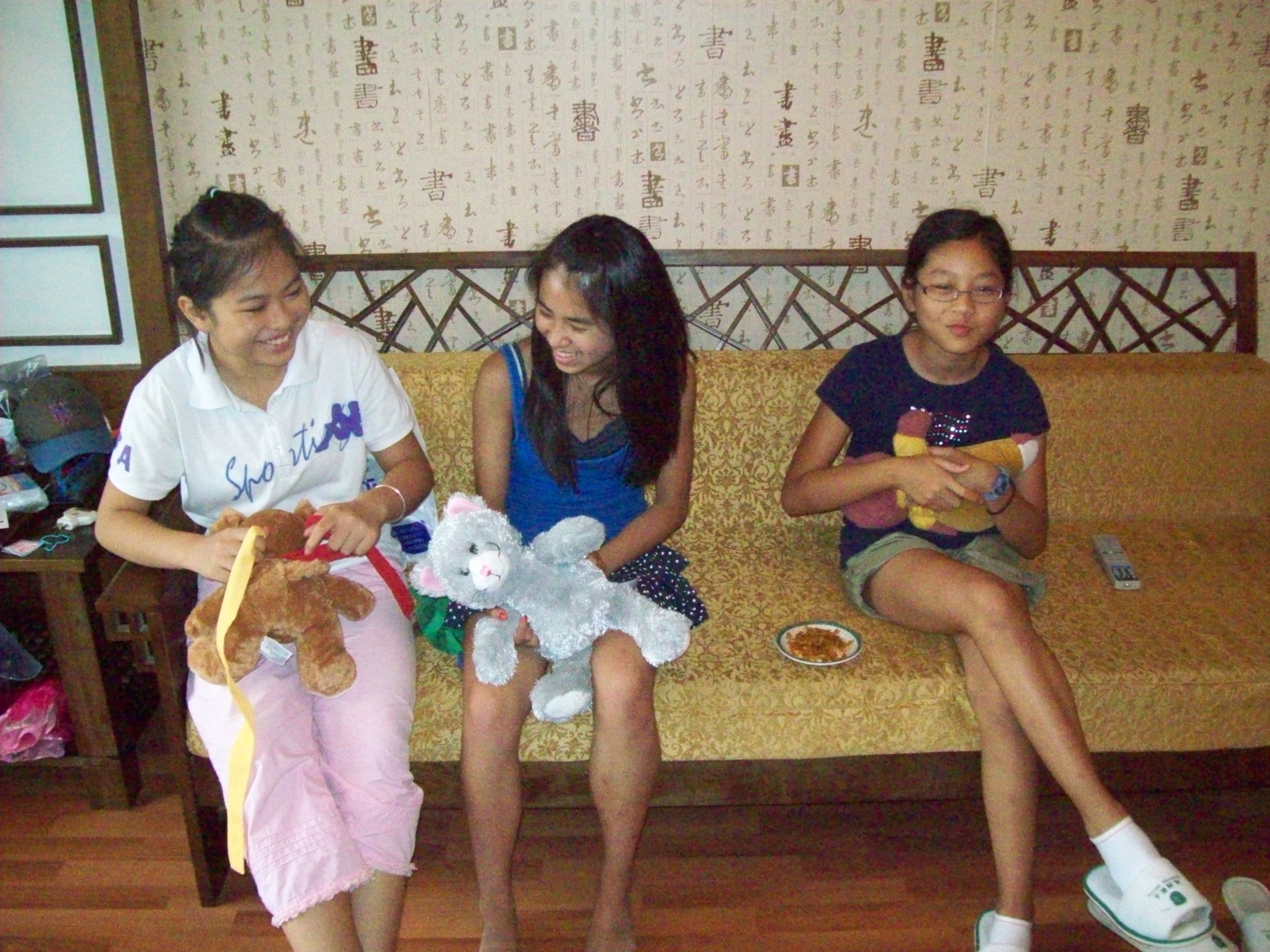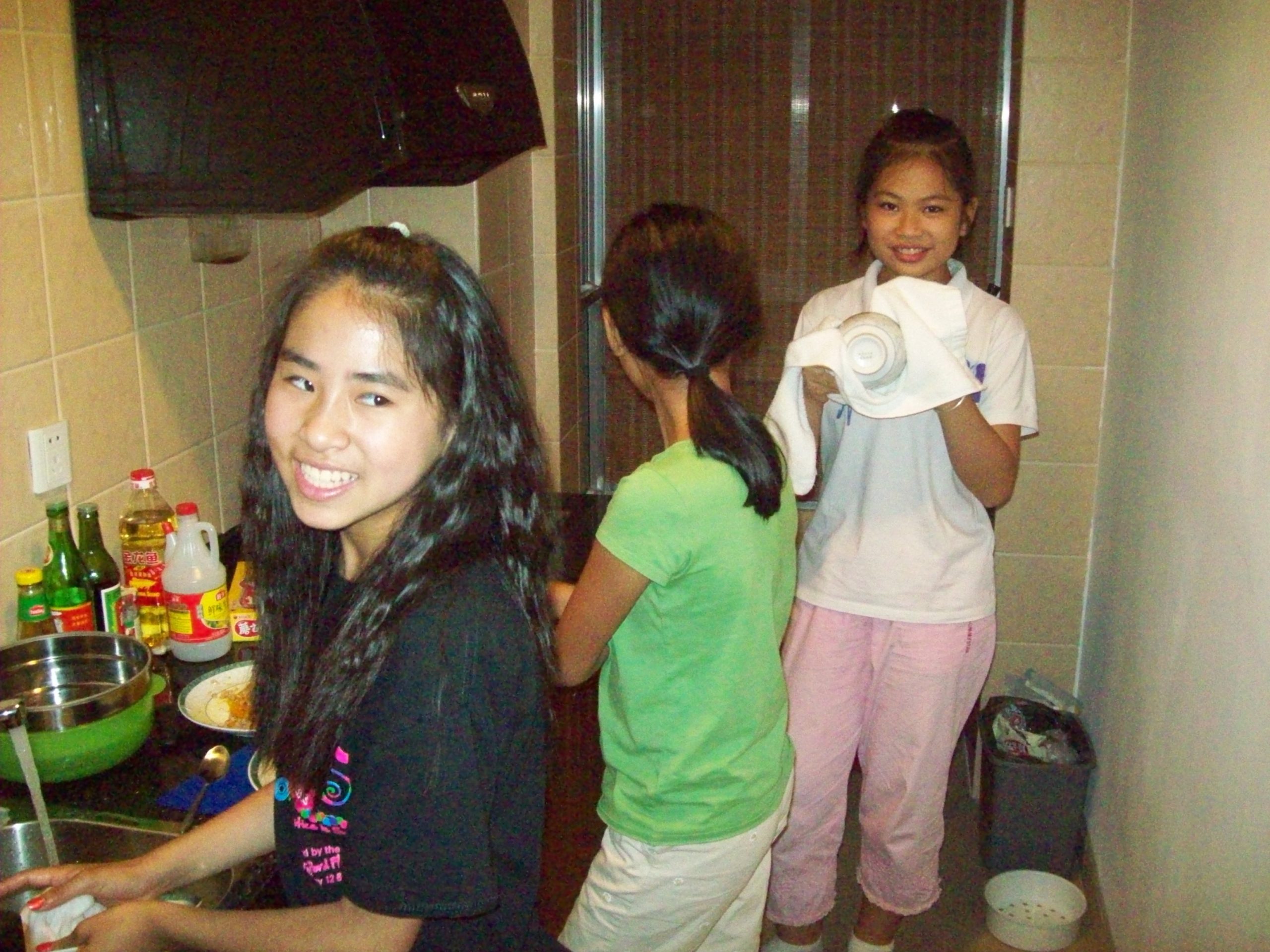
The end of our time in Guilin is only a few days away, and our appetites are starting to drop off. Twice a day, Ms. H. arrives at our apartment with one or two tiny bags of food. She goes off into our hall-sized kitchen that is outfitted with a cutting board, a wok, and a rice cooker, and somehow, within thirty minutes, she presents us with a complete meal, usually two dishes with fresh vegetables and meat. But as always happens when we’ve eaten the same thing for days at a time, we’re finding ourselves eating less and less, and I’ve lost my taste for meat, which figures prominently in dishes here.
Ms. H. asks us if we like fat meat, and we must look puzzled, because she quickly starts drawing characters and pecking at the translation device. “Streaky fat,” the device says next. “Pig’s feet?” Ms. H. tries. Our smiles freeze on our faces. She takes this for confusion and gets busy on the device again. “Fertilized in fat,” it says next.
All day, we’re nervous about what we’re getting for dinner. But then it turns out to be thin pork slices that look a little like bacon. We’re cleaning up when D., Ms. H’s daughter, shows up to visit. We start a game of Uno. D. loves Uno. We’ve taught her some other games, and she’s taught us some other games, but if we give her a choice, she wants to play Uno.
Once, D. brought a friend with her, and after every Uno game, the two of them enthusiastically shuffled and dealt again. After ten games, Sophie gave me a queasy look. After twelve of them, she looked like she might soon jump off the roof of our seventeen-story apartment building. But I thought that it was fun to watch the way D. and her friend approached the game. They divided the pile of cards in half, and then each of them shuffled, and then they dealt cards to us and then each other, just as the Chinese always serve rice to others before serving themselves. In fact, I’ve never seen D. deal cards to herself. Furthermore, D. wanted to play over and over, but she never won. In fact, she’d end up holding at least thirty cards, because, we realized, she was reluctant to play the “mean” cards that required other players to draw or be skipped.

D. still loves to play Uno, but now she knows us well enough to know we’ll just laugh if she plays the “mean” cards, and we’ve won her over to our cutthroat American ways. Tonight, she keeps winning. Soon her mom stops by. We urge her to join us. She does so reluctantly and soon we are all yelling at each other in English and Chinese and laughing. We have decided to play until a new family arrives to stay in an apartment upstairs, a family who comes here every year and are good friends with the H’s.
We’re in the middle of a game when Ms. H’s phone begins yelling in Chinese. That’s her ring tone, a little girl’s voice calling out something like, “Phone call, phone call, phone call.” The new family has arrived. We all leap up and grab our shoes and run out into the hall, still putting them on. We dash into the elevator and head down to the first floor, apparently just as the other family dashes into the other elevator and heads up. Our paths cross. “Phone call, phone call, phone call,” Ms. H’s phone yells in Chinese. We run back into the elevator to go up. D. means to push the “door close” button but she pushes the “door open” button and Ms. H. pushes the “door close” button and the door is confused and we’re all laughing.

And then we land on the fourteenth floor and there they are, another American mother and daughter, and everyone is hugging and shouting and talking in Chinese and English. I’m afraid that Sophie will end up feeling left out, because the other girl speaks fluent Chinese and she and D. are old friends. But the communal ways of doing things that once prevented D. from winning at Uno seem to prevail in friendships, and the group expands to include everyone. For the next few days, the three girls play ping pong downstairs, run off to the noodle shop or to get ice cream, pass around yogurt and crackers and mushroom shaped cookies and other Chinese snacks, use old water bottles to bowl upstairs, and have three-legged races that rattle the light fixtures in our apartment below while I’m working. We eat all our meals together, all six of us, and the other women alternate between English and Chinese and I’m picking up more stuff but also getting headaches from trying to follow conversations. “Wo ting bu dong,” someone is always yelling, which means, “I don’t understand,” and then, for a few seconds, everyone tries to switch languages, leaving at least one of us confused. But we’re having fun and food tastes good again.
Just when we were about ready to leave Guilin, now we’re not ready, after all.